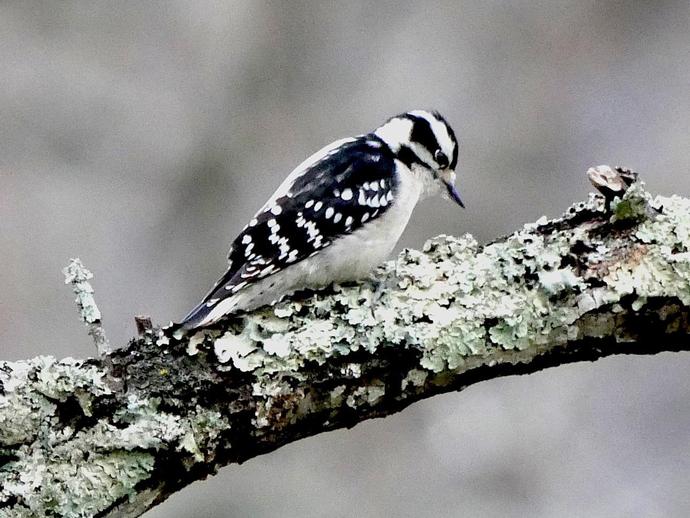December 14, 2020
Ben here with the Monday edition of #BenInNature! The downy woodpecker (Dryobates pubescens) is North America's smallest woodpecker. This one is a female, and it's fairly easy to tell the difference between the males and females of this species: the males have a little red spot on top of their heads while the females do not. However, while it's easy to tell the sexes apart, it's a little harder to tell the difference between this species and the hairy woodpecker (Leuconotopicus villosus). The coloration on both species is extremely similar, but the easiest way to tell the difference is that hairy woodpeckers are a few inches larger and have longer beaks than downy woodpeckers.
Downy woodpeckers tend to be about 5-7 inches in length with a wingspan of 10-12 inches. They're most often found in deciduous forests in North America, and they can be found year-round in Virginia. These little woodpeckers tend to nest in tree cavities that are excavated by the nesting pair. They peck at tree bark to find insects to feed on, and they'll also eat seeds and berries. They're easier to spot during the winter because they'll readily enter suburban areas with mature trees and feed at suet feeders.
These woodpeckers are a fantastic ally to farmers because they're a natural predator of the invasive European corn borer moth (Ostrinia nubilalis). These moths cause more than a billion dollars in crop losses per year, but the downy woodpecker does its part to combat those losses (and get a tasty treat in the process!)
ABOUT #BenInNature
Social distancing can be difficult, but it presents a great opportunity to become reacquainted with nature. In this series of posts, Administrator of Science Ben Williams ventures outdoors to record a snapshot of the unique sights that can be found in the natural world. New updates are posted Monday - Friday, with previous posts highlighted on the weekends.
NEW: TRIVIA CHALLENGE
You've seen the posts. You've learned the facts. Now, it's time to prove you are a #BenInNature Mega Fan! The museum's education team has developed the #BenInNature Trivia Challenge to identify the most devoted fans out there! Everyone who successfully answers each trivia question correctly will be congratulated by having your own nature selfie posted to the museum's #BenInNature Mega Fan Photo Album on the official VMNH Facebook page! Learn more and download the trivia challenge today by visiting www.vmnh.net/research-collections/beninnature-trivia-challenge.
NATURE PHOTO IDENTIFICATIONS
If you discover something in nature that you would like help identifying, be sure to message us right here on Facebook with a picture (please include location and date of picture) and we'll have our experts help you identify it!

 Hours & Admissions
Hours & Admissions Directions
Directions

